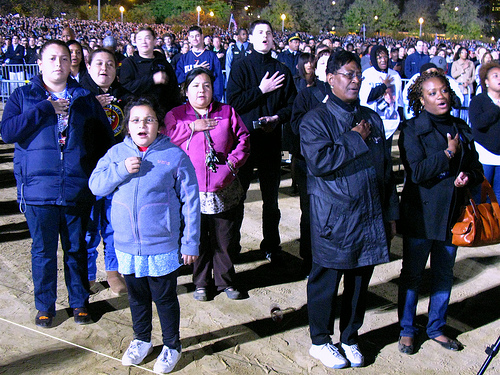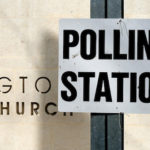We run our website the way we wished the whole internet worked: we provide high quality original content with no ads. We are funded solely by your direct support. Please consider supporting this project.

Should Christians Recite the Pledge of Allegiance?
A number of years ago I attended a basketball game at a Christian school. Just before the game everyone was asked to stand and say the Pledge of Allegiance. So I stood, placed my hand over my heart, and began to recite our national creed. Halfway through, however, I began to wonder what I was doing. I’m called to live as a foreigner in a strange land. I’m called to be a citizen of the Kingdom that is not of this world. I’m called to live as a soldier stationed in enemy occupied territory who has the job of carrying out the will of my enlisting officer. Yet here I was pledging allegiance not to Christ, but to the flag of a foreign land in which I happened to be stationed.
Early Christians were willing to be martyred rather than express allegiance to the Roman Empire, but here I was expressing allegiance to the American empire. This didn’t seem right. I stopped and haven’t said the Pledge since. I love America, but I cannot serve two masters. My allegiance must be pledged to Christ alone.
I acknowledge that people have different opinions about this matter. Some have told me they recite the Pledge to express support for the good things America stands for, not to express their ultimate allegiance to it. Others have told me they do it out of respect for those who have sacrificed their lives to defend our rights and freedoms, but again, not to pledge their ultimate allegiance. Others have told me they do it simply because they feel like a communist if they don’t. Fine. My concern isn’t with this particular American ritual.
What concerns me is that it doesn’t even occur to many American Christians that there might be a conflict between their allegiance to Christ and their Pledge of Allegiance to America. Their faith has become so nationalized that they assume these dual allegiances are compatible. This is an idolatrous assumption, and it helps explain why the lives of most American Christians are indistinguishable from the lives of their pagan American neighbors. We’re failing to revolt against the pagan values of our nation because the nation with its pagan values, has our allegiance—to the point that many followers of Jesus don’t even recognize the pagan values as pagan. They rather think the nation, with its values, is basically “Christian”!
It’s time for Kingdom people in America to be done with this. Our ultimate allegiance cannot be to America or any other country. It cannot be to a flag, democracy, the right to defend ourselves, the right to do what we want, the right to vote, or the right to pursue happiness however we see fit. We are Kingdom people only to the extent that God alone is King of our lives, and thus only to the extent that we revolt against the temptation to make any cultural values or ideas supreme.
—Adapted from Myth of a Christian Religion, pages 87-88.
Image by TheeErin via Flickr
Category: Q&A
Tags: America, Myth of a Christian Nation, Myth of a Christian Religion, Nationalism, Politics
Topics: Ethical, Cultural and Political Issues
Related Reading

Spiritual Warfare: What is it?
The Kingdom is “not of this world,” and neither is its warfare. Jews had always believed that God confronted spiritual opposition in carrying out his will on earth. In the Old Testament, these evil forces were usually depicted as cosmic monsters and hostile waters that threatened the earth. For a variety of reasons this belief…

Anti-American?
Kurt Willems posted a response to the accusation he often gets that he’s anti-American. He also included a video of Greg giving his own response to this question. Take a look! From Kurt’s blog: I am not, in any way, anti-American. In fact, I’m not anti-anyone. I believe that the way of Jesus compels us…

Jesus and Democracy
Question: I’ve heard that the reason Jesus didn’t speak up on political issues was because he didn’t have the benefit of living in a democracy. Since we do, don’t we have a duty both to God and our country to be involved in politics? Answer: If the reason Jesus didn’t speak up on political issues…

God’s Non-Violent Ideal in the OT
While God condescended to working within the violent-prone, fallen framework of his people in the Old Testament—as I argue in Crucifixion of the Warrior God—the OT is also full of references to how God worked to preserve his non-violent ideal as much as possible. He did this by continually reminding his people not to place…

Jesus’ Kind of Social Justice
For many, the primary way of building the kingdom is to influence politics in order to make America more Christian. Others take the opposite approach, concluding that Jesus didn’t try to overhaul the political systems of his day through political means; therefore Christian faith is only a private matter that has no social relevance. Both…

Hate-Filled Prayers
I came across a story about this billboard at 4:00 yesterday morning and tweeted on it. It would be easy to dismiss this sad display as an isolated act of a crazed fanatic, but I think it actually symbolizes the demonic animosity that permeates our current political climate. In fact, this is the third time…
